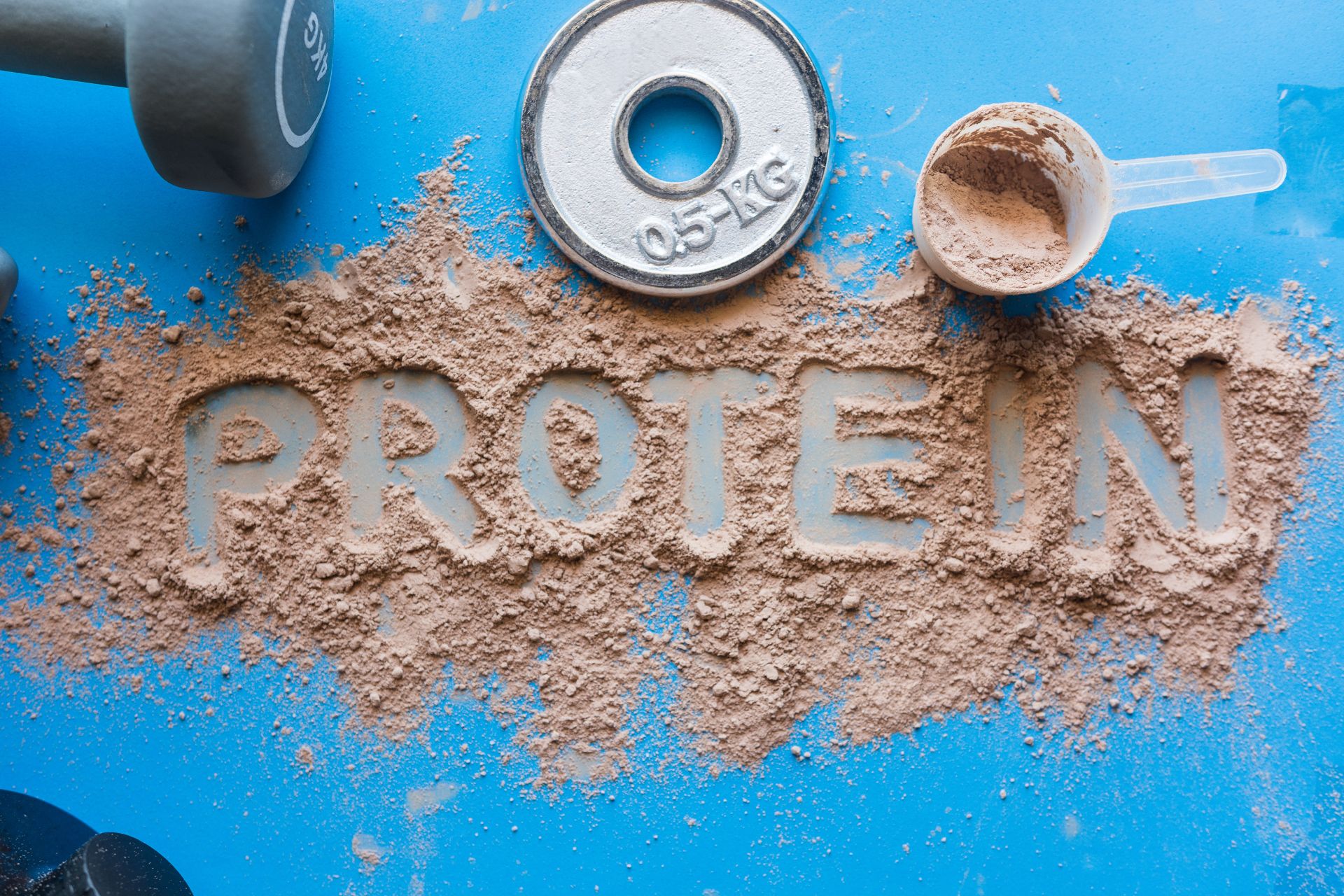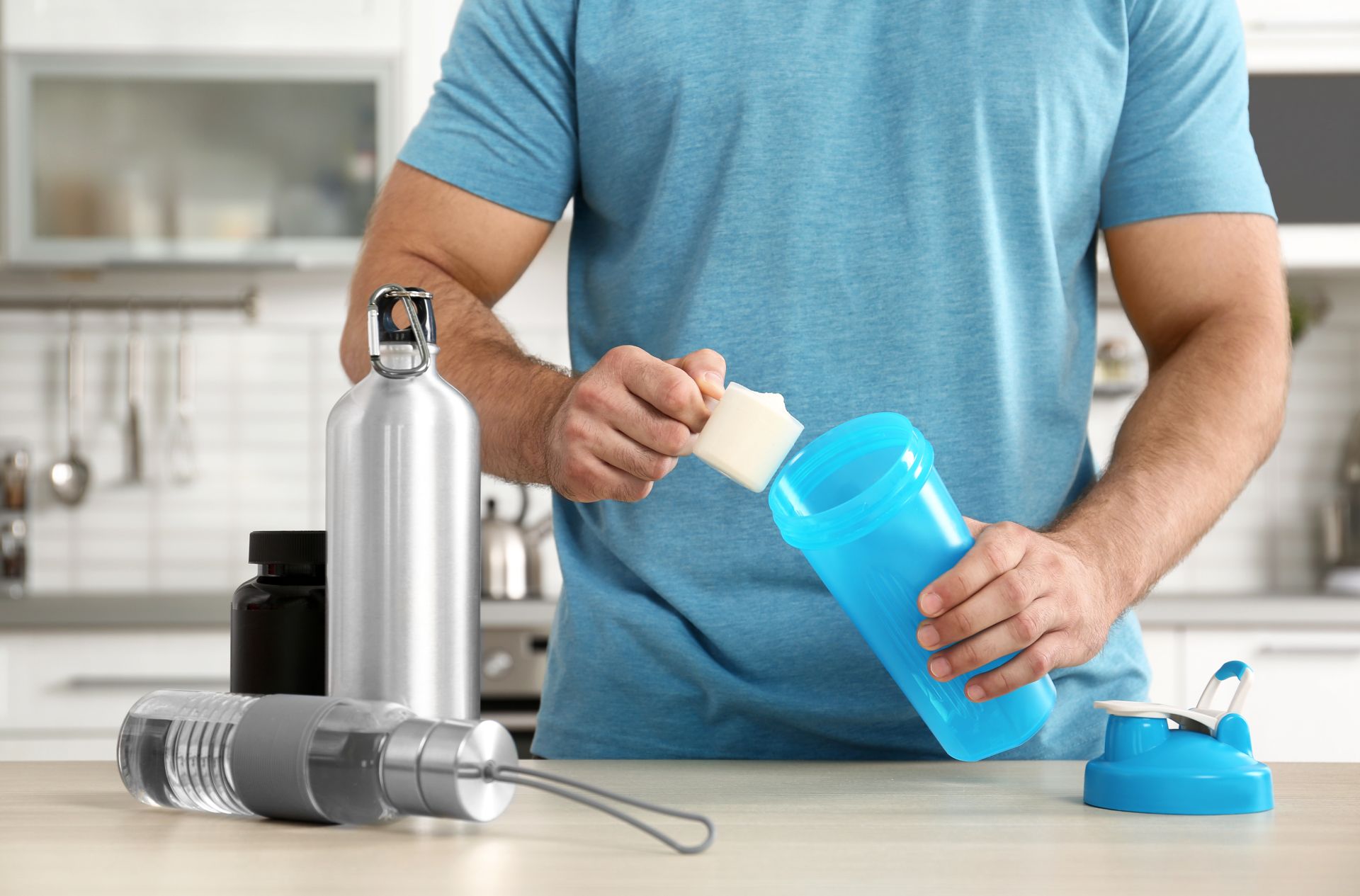heading_title

Adequate intake of complete protein is an important part of the diet of a person who regularly engages in physical activity. Professional and amateur athletes often use protein powder supplements to provide the recommended amount of protein in the diet. Let's find out what protein powder nutrients are, how they work and how to use them properly.
- What are protein powder nutrients?
- Protein powder supplements - types
- How do protein powder nutrients work?
- Who are protein powder nutrients for?
- How to use protein powder nutrients?
- Protein powder conditioners - contraindications
What are protein powder nutrients?
Protein powder conditioners are increasingly common products on the market that supplement the diet with easily digestible protein with high digestibility. They are typically rich in essential amino acids (essential for the human body), including all three branched-chain amino acids (BCAAs), which include isoleucine, leucine and valine. Powdered protein nutrients are easy and quick to prepare, as it is entirely sufficient to mix them thoroughly with water, cow's milk, yogurt or your favorite plant-based beverage. They are a very common ingredient in post-workout shakes for people who regularly practice sports. Besides, protein powder nutrients are commonly added to omelets, fruit smoothies, healthy cakes and desserts, as well as morning oatmeal and porridge to increase the amount of protein in the diet of physically active people.
Protein powder supplements - types
The market for sports nutrition and supplements has been growing rapidly in recent years. Protein powder nutritional supplements are one of the most widely used products by sports people. There are many types of protein powder nutritional supplements, of which the following products are most commonly found in stores:
- Whey protein (concentrate - WPC, isolate - WPI and hydrolyzate - WPH),
- Casein,
- Egg albumin (egg white),
- Beef protein (hydrolysate or isolate),
- Soy protein (isolate),
- Hemp protein,
- Pea protein (isolate),
- Rice protein,
- Yeast protein(Saccharomyces cerevisiae),
- Spirulina powder,
- Blends of plant proteins (vegan), which include sunflower protein, pumpkin seed protein, flaxseed protein and quinoa protein, among others.
How do protein powder nutrients work?
Protein powder nutrients have been classified by the Australian Institute of Sport (AIS) as Category A, which includes only products with well-proven performance in sports. Studies have shown that protein nutrients help increase muscle mass and strength, and even more so in a group of people who regularly perform strength training. In addition to this, protein nutrient powders are effective in preventing the loss of muscle mass during a long-term low-calorie reduction diet. Protein powder nutrients (especially whey protein-based) have been shown to have a beneficial effect on body composition, as they help reduce body fat mass, waist circumference and BMI, and at the same time can increase muscle mass in people who regularly perform strength training and follow a well-balanced reduction diet. Protein powder supplements (especially casein and whey proteins) effectively stimulate skeletal muscle protein synthesis (MPS) and at the same time inhibit muscle protein breakdown (MPB) due to their high content of leucine and other essential amino acids. Regular use of protein powder supplements activates anabolic processes throughout the body and accelerates the rate of skeletal muscle recovery after intense strength training.

Who are protein powder nutrients for?
Protein powder nutritional supplements are mainly intended for people who engage in competitive as well as recreational sports to meet increased 24-hour protein requirements. They are especially useful for those who lead busy lifestyles and have little time to prepare several well-balanced meals during the day. In addition, protein powder supplements are recommended for people who have great difficulty in providing adequate protein from food during the period of building muscle mass and reducing body fat. They will work great for vegans and underweight people with a weakened appetite, who have trouble regularly consuming large volume meals in a weight-building diet. Protein powder nutrients are also a good idea for older people to counteract the onset of sarcopenia, which is the loss of skeletal muscle mass, strength and power with age.
How to use protein powder nutrients?
Easily digestible and well-digested protein powder nutrients are especially recommended to be consumed in the first meal after training to stimulate MPS and inhibit MPB. Studies have shown that the greatest gains in strength and muscle mass are observed when full-fat protein is consumed after exercise, such as up to 1-2 hours after weight training. Protein powder supplements should be consumed in the amount of about two scoops after training so as to provide close to 40 grams of protein. And for other meals, protein powder nutrients can be used in smaller amounts (e.g., half or one measure) to increase the protein level in a meal, such as your morning oatmeal or evening fruit shake.
Protein powder conditioners - contraindications
Protein powder conditioners are well tolerated by the vast majority of people who treat them only as a dietary supplement and consume them in moderate amounts. The main contraindication to the use of protein powder nutrients based on milk proteins (casein and whey protein) is a diagnosed allergy to cow's milk proteins. In addition, some protein powders also contain milk sugar (lactose) and other components of the FODMAP group (mainly fructans), so people with lactose intolerance and gastrointestinal conditions (such as irritable bowel syndrome - IBS, small intestinal bacterial overgrowth - SIBO, inflammatory bowel disease) should avoid consuming such protein supplements. It is also worth mentioning that selected protein nutrient powders (e.g., casein and whey protein) can aggravate acne lesions on the face and torso in some people.
Sources:
-
Samal JRK, Samal IR: Protein Supplements: Pros and Cons. J Diet Suppl. 2018 May 4;15(3):365-371. https://pubmed.ncbi.nlm.nih.gov/28937838/
-
Kårlund A, Gómez-Gallego C, Turpeinen AM, et al.: Protein Supplements and Their Relation with Nutrition, Microbiota Composition and Health: Is More Protein Always Better for Sportspeople? Nutrients. 2019 Apr 12;11(4):829. https://pubmed.ncbi.nlm.nih.gov/31013719/
-
Vasconcelos QDJS, Bachur TPR, Aragão GF.: Whey protein supplementation and its potentially adverse effects on health: a systematic review. Appl Physiol Nutr Metab. 2021 Jan;46(1):27-33. https://pubmed.ncbi.nlm.nih.gov/32702243/
-
Wirth J, Hillesheim E, Brennan L.: The Role of Protein Intake and its Timing on Body Composition and Muscle Function in Healthy Adults: A Systematic Review and Meta-Analysis of Randomized Controlled Trials. J Nutr. 2020 Jun 1;150(6):1443-1460. https://pubmed.ncbi.nlm.nih.gov/32232404/
-
Hansen TT, Astrup A, Sjödin A.: Are Dietary Proteins the Key to Successful Body Weight Management? A Systematic Review and Meta-Analysis of Studies Assessing Body Weight Outcomes after Interventions with Increased Dietary Protein. Nutrients. 2021 Sep 14;13(9):3193. https://pubmed.ncbi.nlm.nih.gov/34579069/
-
Nunes EA, Colenso-Semple L, McKellar SR, et al: Systematic review and meta-analysis of protein intake to support muscle mass and function in healthy adults. J Cachexia Sarcopenia Muscle. 2022 Apr;13(2):795-810. https://pubmed.ncbi.nlm.nih.gov/35187864/
-
Sepandi M, Samadi M, Shirvani H, et al: Effect of whey protein supplementation on weight and body composition indicators: A meta-analysis of randomized clinical trials. Clin Nutr ESPEN. 2022 Aug;50:74-83. https://pubmed.ncbi.nlm.nih.gov/35871954/
-
https://www.ais.gov.au/nutrition/supplements/group_a#isolated_protein_supplement
 ⮜ Previous article
⮜ Previous article
Does meal frequency matter?
 Next article ⮞
Next article ⮞